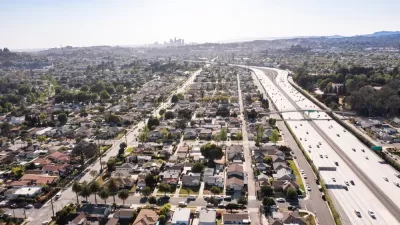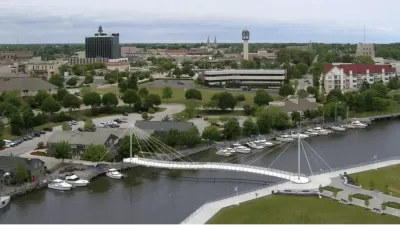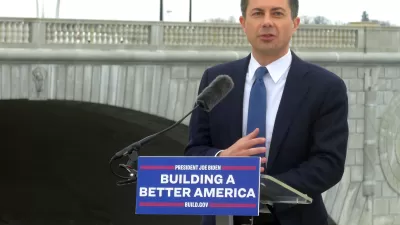The Biden administration has talked about the need to repair the damages of a racist history of transportation planning in the United States. The time has finally come to put their money where their mouth is.

The U.S. Department of Transportation last week announced the Reconnecting Communities pilot program, a first-of-its kind federal program designed to “reconnect communities that were previously cut off from economic opportunities by transportation infrastructure,” according to a June 30 press release.
“Reconnecting a community could mean adapting existing infrastructure– such as building a pedestrian walkway over or under an existing highway– to better connect neighborhoods to opportunities or better means of access such as crosswalks and redesigned intersections,” adds the press release.
U.S. Department of Transportation Secretary Pete Buttigieg was in Birmingham, Alabama to announce that the pilot program is now accepting applications for funding. Birmingham was chosen for the announcement thanks to its ongoing work on the Birmingham Xpress project—"new bus rapid transit service that will connect Alabamans in 25 communities to jobs, schools, and healthcare.”
The Reconnecting Communities has $1 billion in funding allotted in the 2021 Infrastructure Investment and Jobs Act.
The U.S. Department of Transportation on the same day announced the “Thriving Communities Initiative to provide technical assistance and hands-on planning support for transformative infrastructure projects that serve disadvantaged communities,” according to the press release. “This includes a new DOT Navigator to provide better access to technical assistance programs across the Department, and a new program to provide capacity building support to communities.”
For news coverage of the Reconnecting Communities pilot program, see an article by Kea Wilson for Streetsblog USA, which identifies and details four key takeaways from the announcement: 1) t probably won’t remove many highways … at least not on its own, 2) It’s not just about highways, 3) Equitable projects are most likely to win this money, and 4) It’s not just $1 billion.
Another article by Daniel C. Vock for Route Fifty provides additional news coverage of the Reconnecting Communities pilot program, noting up from that the $1 billion allotted for the program is a far cry from the $20 billion sought for the program by the Biden administration.
FULL STORY: Biden Administration Announces First-Ever Funding Program Dedicated to Reconnecting American Communities

Study: Maui’s Plan to Convert Vacation Rentals to Long-Term Housing Could Cause Nearly $1 Billion Economic Loss
The plan would reduce visitor accommodation by 25,% resulting in 1,900 jobs lost.

North Texas Transit Leaders Tout Benefits of TOD for Growing Region
At a summit focused on transit-oriented development, policymakers discussed how North Texas’ expanded light rail system can serve as a tool for economic growth.

Why Should We Subsidize Public Transportation?
Many public transit agencies face financial stress due to rising costs, declining fare revenue, and declining subsidies. Transit advocates must provide a strong business case for increasing public transit funding.

How to Make US Trains Faster
Changes to boarding platforms and a switch to electric trains could improve U.S. passenger rail service without the added cost of high-speed rail.

Columbia’s Revitalized ‘Loop’ Is a Hub for Local Entrepreneurs
A focus on small businesses is helping a commercial corridor in Columbia, Missouri thrive.

Invasive Insect Threatens Minnesota’s Ash Forests
The Emerald Ash Borer is a rapidly spreading invasive pest threatening Minnesota’s ash trees, and homeowners are encouraged to plant diverse replacement species, avoid moving ash firewood, and monitor for signs of infestation.
Urban Design for Planners 1: Software Tools
This six-course series explores essential urban design concepts using open source software and equips planners with the tools they need to participate fully in the urban design process.
Planning for Universal Design
Learn the tools for implementing Universal Design in planning regulations.
City of Santa Clarita
Ascent Environmental
Institute for Housing and Urban Development Studies (IHS)
City of Grandview
Harvard GSD Executive Education
Toledo-Lucas County Plan Commissions
Salt Lake City
NYU Wagner Graduate School of Public Service




























